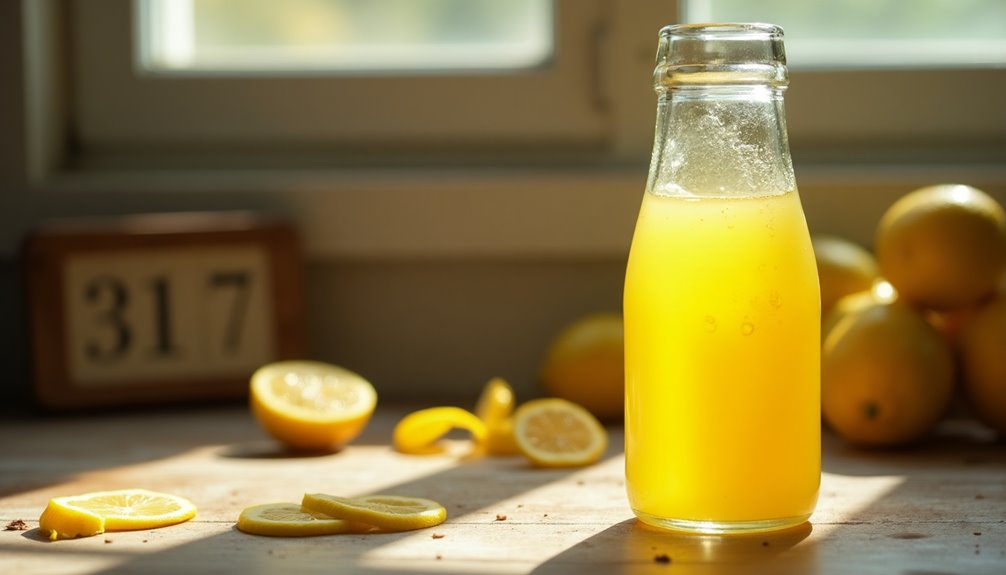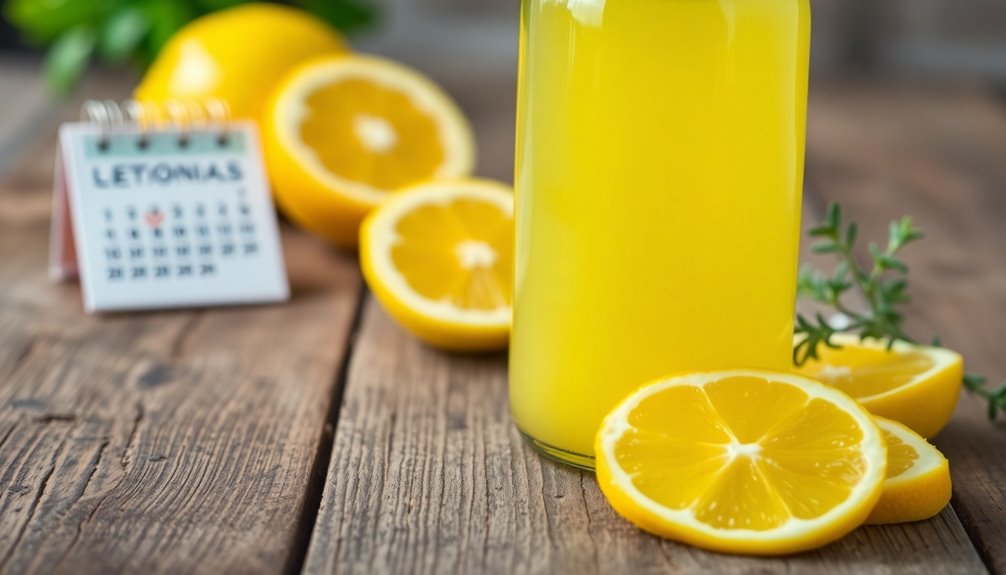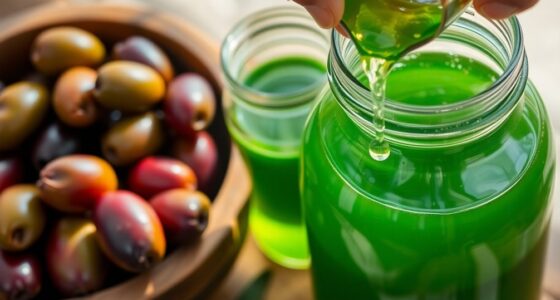Bottled lemon juice can stay fresh for up to 18 months when unopened, thanks to pasteurization and added preservatives. After you open it, store it in the fridge, and it'll be good for about 3 to 9 months. To keep the quality high, always seal it tightly. Always check for signs of spoilage, like changes in color, smell, or taste, before using it. Want more tips on how to keep your lemon juice fresh?
Key Takeaways
- Unopened bottled lemon juice can last up to 18 months when stored in a pantry.
- After opening, it should be refrigerated and can last up to 9 months.
- Quality is typically maintained for 3 to 6 months in the fridge with proper sealing.
- Expiration dates are guidelines; juice may still be safe for months post-expiration.
- Always check for signs of spoilage, such as changes in color, smell, or taste.

Have you ever wondered how long bottled lemon juice stays fresh? It's a common question, especially if you love using it in your cooking or cocktails. The good news is that if you store it properly, your bottled lemon juice can last quite a while. Unopened bottles of lemon juice can maintain their freshness for up to 18 months when kept in a pantry, thanks to the pasteurization process and added preservatives. So, if you've got an unopened bottle sitting on your shelf, you can rest easy knowing it's still good for a long time.
Once you crack that bottle open, the rules change a bit. Once opened, bottled lemon juice should be stored in the refrigerator to keep it fresh. When you do this, it can last for up to 9 months, but this is only if you practice proper storage methods. Always make sure to tightly seal the cap after each use to minimize exposure to air, which can degrade the quality over time. After opening, you can expect the juice to maintain its quality for about 3 to 6 months in the fridge.
It's essential to pay attention to the expiration date on the bottle. This date is generally a guideline, and many times, you can safely consume the juice for several months after it. However, this is where being vigilant comes into play. Before using your store-bought juice, inspect it for any signs of spoilage. Look for changes in color, smell, or taste. If you notice anything off, it's best to err on the side of caution and discard it. Fresh lemon juice has a vibrant yellow color and a zesty aroma, so any dullness or off-putting smells can be a red flag.
You might wonder why some bottled lemon juices can last longer than others. This longevity often comes down to the added preservatives that store-bought juices contain. These preservatives help to maintain flavor and prevent spoilage, allowing you to enjoy your lemon juice for an extended period.
However, even with these preservatives, your lemon juice can only stay good if you follow the recommended storage practices.
Frequently Asked Questions
Does Lemon Juice in a Bottle Go Bad?
Yes, bottled lemon juice can go bad. You should always check for signs of spoilage, like an off smell, cloudiness, or color changes.
If you notice any of these, it's best to toss it. Even if it's past the best-by date, the juice might still be safe to consume, but its flavor and quality mightn't be great.
Store it properly in the fridge after opening to keep it fresh longer.
Does Unopened Bottled Lime Juice Go Bad?
Imagine you're in a retro diner, sipping a zesty lime soda.
Now, about that unopened bottled lime juice—it can last up to 18 months if you store it in a cool, dark place.
Its pasteurization and preservatives keep it stable, but always check for off odors or color changes before using it.
Even if it's past the best-by date, it might still be safe, so trust your senses!
How Do You Know if Lemon Has Gone Bad?
You can tell if lemon juice has gone bad by checking for several signs.
Look for cloudiness or unusual texture; these indicate spoilage. If it smells off or deviates from its usual tangy aroma, it's time to toss it.
A significantly sour taste or visible mold also signals it's expired.
Always trust your instincts—when in doubt, it's safer to dispose of lemon juice than risk consuming something spoiled.
How Long Does Jif Lemon Juice Last?
Jif lemon juice lasts longer than you might think! When unopened, it can stay fresh for up to 18 months in your pantry, thanks to its preservatives.
Once you crack it open, aim to use it within 6 months for peak flavor. To keep it at its best, store it airtight in the fridge.
Always watch for spoilage signs like off odors or mold, and check that best-by date for extra assurance.
Conclusion
In conclusion, bottled lemon juice can last quite a while if stored properly, typically up to 1-2 years unopened and about 6 months once opened. As the saying goes, “A stitch in time saves nine,” so take a moment to check the expiration date and store it in the fridge after opening. This way, you’ll ensure you’re getting the best flavor and quality for your recipes. Enjoy that zesty kick in your dishes without worry! Additionally, it’s important to note that the real lemon juice shelf life can vary depending on the brand and any preservatives used. Always pay attention to any changes in color, smell, or taste, as these can be indicators that the juice has spoiled. By keeping an eye on these signs, you can make the most out of your bottled lemon juice and ensure it enhances your culinary creations for as long as possible.
Cindy thoroughly researches juicing trends, techniques, and recipes to provide readers with practical advice and inspiration. Her writing style is accessible, engaging, and designed to make complex concepts easy to understand. Cindy’s dedication to promoting the advantages of juicing shines through her work, empowering readers to make positive changes in their lives through the simple act of juicing.

















